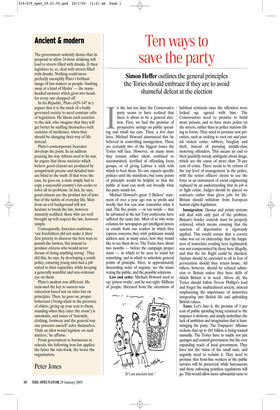Ancient & modern
The government ardently denies that its proposal to allow 24-hour drinking will lead to streets filled with drunks. It then legislates to, er, deal with streets filled with drunks. Nothing could more perfectly exemplify Plato’s brilliant image of law-makers as people ‘slashing away at a kind of Hydra’ — the manyheaded monster which grew two heads for every one chopped off.
In his Republic, Plato (429–347 BC) argues that it is the mark of a badly governed society to need constant rafts of legislation. He likens such societies to the sick, who imagine that they will get better by stuffing themselves with varieties of medicines, when they should be changing their way of life instead.
Plato’s contemporary Isocrates develops the point. In an address praising the way Athens used to be run, he argues that those societies which believe good citizens are produced by scrupulously precise and detailed laws are blind to the truth. If that were the case, he goes on, a state simply had to copy a successful country’s law-codes to solve all its problems. In fact, he says, good citizens are the product not of laws but of the habits of everyday life. Men from an evil background will not hesitate to break the law, however minutely codified; those who are well brought up will respect the law, however simple.
Consequently, Isocrates continues, ‘our forefathers did not make it their first priority to discover the best ways to punish the lawless, but instead to produce citizens who would never dream of doing anything wrong’. They did this, he says, by developing a youth policy, ensuring young men had a job suited to their capacities, while keeping a generally watchful and zero-tolerant eye on them.
Plato’s analysis was different. He reckoned the key to success was education based not on rules but on principles. Then, he goes on, proper behaviour (‘being silent in the presence of elders, giving up your seat to them, standing when they enter the room’) is automatic, and issues of ‘hairstyle, clothing, footwear and the general way one presents oneself’ solve themselves. ‘Only an idiot would legislate on such matters,’ he affirms.
From government to businesses to schools, the following iron law applies: the fatter the rule-book, the worse the organisation.
Peter Jones















































 Previous page
Previous page